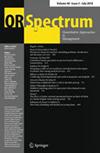基于空闲时间数据的共享出行系统动态定价
IF 1.4
4区 管理学
Q3 OPERATIONS RESEARCH & MANAGEMENT SCIENCE
引用次数: 0
摘要
在当今大多数主要城市中,存在着各种各样的共享出行系统,如汽车或自行车共享。维护这些系统具有挑战性,因此,公共和私人供应商都在努力提高运营性能。为此目的在实践中经常记录和监测的一个重要指标是闲置时间,即车辆在两次租赁之间闲置的时间。通常,它适用于不同的时间和空间粒度。与此同时,动态定价已被证明是提高共享出行系统运营绩效的有效手段,但传统动态定价方法所需的数据,如无约束需求,在实践中很少可用。因此,基于空闲时间数据的动态定价似乎很有希望,并提出了第一个想法。然而,现有的方法要么基于简单的业务规则,要么基于短视优化。在这项工作中,我们开发了一种新的动态定价方法,通过在线优化来确定价格,从而通过整合空闲时间数据来预测未来的利润。其核心思想是通过使用空闲时间来量化剩余的盈利时间。在实际应用方面,所开发的方法是通用的,因为不同类型的现成的历史空闲时间数据可以无缝集成,即不同时空粒度的数据。在一项广泛的数值研究中,我们证明了操作性能随着粒度的增加而增加,并且最高粒度的方法在利润方面优于当前定价实践高达11%。本文章由计算机程序翻译,如有差异,请以英文原文为准。
Dynamic pricing for shared mobility systems based on idle time data
Abstract In most major cities today, various shared mobility systems such as car or bike sharing exist. Maintaining these systems is challenging, and, thus, public and private providers strive to improve operational performance. An important metric which is regularly recorded and monitored in practice for this purpose is idle time, i.e., the time a vehicle stands unused between two rentals. Usually, it is available for different temporal and spatial granularities. At the same time, dynamic pricing has been shown to be an efficient means for increasing operational performance in shared mobility systems, but data necessary for traditional dynamic pricing approaches, like unconstrained demand, is much less available in practice. Thus, dynamic pricing based on idle time data appears promising and first ideas have been proposed. However, the existing approaches are based either on simple business rules or on myopic optimization. In this work, we develop a novel dynamic pricing approach that determines prices by online optimization and thereby anticipates future profits through the integration of idle time data. The core idea is quantifying the remaining profitable time by using idle times. With regard to application in practice, the developed approach is generic in the sense that different types of readily available historical idle time data can be seamlessly integrated, meaning data of different spatio-temporal granularities. In an extensive numerical study, we demonstrate that the operational performance increases with higher granularity and that the approach with the highest one outperforms current pricing practice by up to 11% in terms of profit.
求助全文
通过发布文献求助,成功后即可免费获取论文全文。
去求助
来源期刊

or Spectrum
管理科学-运筹学与管理科学
CiteScore
4.90
自引率
0.00%
发文量
32
审稿时长
6 months
期刊介绍:
OR Spectrum publishes applied and theoretical papers which contribute to Operations Research as a scientific instrument for the development and application of quantitative approaches for problem-solving and decision-making in management. It addresses all persons from university, industry, business and administration interested in innovative applications of quantitative methods as well as in advances in theory and techniques with relevance to practice.
The journal provides an international forum for academics and practitioners from areas such as quantitative management science, mathematical operations research, and related fields of engineering and information systems. It publishes high-quality, original papers belonging to the following types of contributions: Surveys, theoretical papers, application-oriented papers, and case studies. Papers must be written in English. All contributions are reviewed by at least two referees.
 求助内容:
求助内容: 应助结果提醒方式:
应助结果提醒方式:


